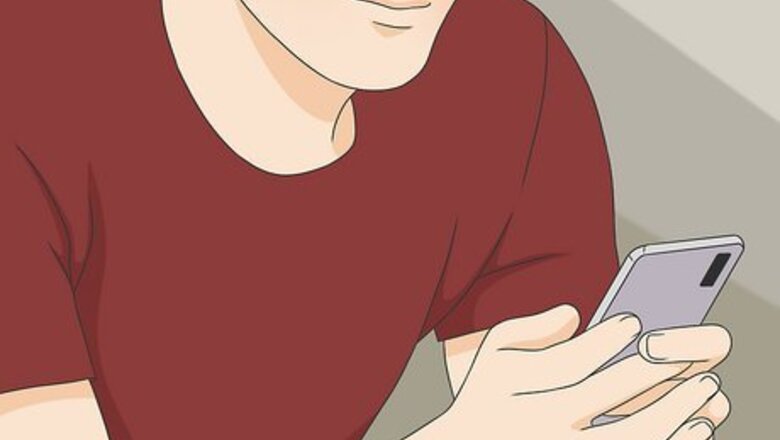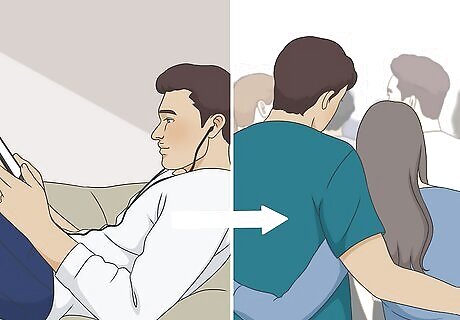
views
- A clingy boyfriend may text or call you constantly and get upset when you spend time with others. He may neglect his own friendships and hobbies.
- You might have a clingy boyfriend if he’s overly agreeable, shying away from voicing his opinions but needing lots of validation and reassurance.
- Deal with a clingy boyfriend by setting boundaries and discussing the situation with him. Build trust together so he doesn’t feel the need to be clingy!
Signs You Have a Clingy Boyfriend

He texts you constantly. It’s normal to text a significant other multiple times a day—but if your boyfriend is texting every hour (or more), wanting to know where you are and what you’re doing, there’s likely a problem. He might also get anxious if you don’t text back immediately, and too much texting is exhausting and intrusive, signaling that he may have control or trust issues.

He stops spending time with his friends. A clingy boyfriend might stop making an effort to hang out with his friends and spend all his time with you instead. He may even go so far as to cancel plans to be with you instead, letting his whole world revolve around you. Unfortunately, dropping all his friends means you’re left as his only real source of company or support. Devoting all his time to you means a clingy boyfriend may not have friends or other aspects of his life to focus on. This can lead to relationship anxiety; he might become so reliant on you that he can’t stand the thought of any tension or conflict.

He gets upset when you spend time alone with friends. Whenever you’re going to hang out with other friends, a clingy boyfriend might invite himself along or get upset and insecure at the idea of you spending time without him. He might demand to know where you’re going and who you’re seeing—and even if he doesn’t tag along, he may bombard you with calls and texts.

He gets extremely jealous. Everyone gets a little jealous occasionally, but the healthy thing to do is control that jealousy—whereas a clingy boyfriend might not be able to. He may become possessive even over minor things and have irrational fears about you spending time with other guys. He may distrust anyone you’re close to or even try to sabotage those relationships. Even if you tell him often that you’re just friends with someone, he might convince himself something is going on, indicating a lack of trust on his part.

He relies on you for constant reassurance. No matter how often you tell him how much you love him or how amazing he is, it might feel like he doesn’t quite believe you and needs to hear those words repeatedly. Clinginess can stem from a lack of self-confidence or self-esteem—and if that’s the case, your boyfriend may depend on you to boost his fragile ego. It may feel like he only does things for you so you’ll praise him rather than for the sake of being thoughtful. He may regularly ask questions like “Do you really love me?” or “How much do you love me?” or even try to guilt trip you if you don’t validate his feelings.

He doesn’t give you any personal space. All couples need space and alone time to maintain a healthy relationship, but a clingy boyfriend might not understand that. He may struggle to give you any space and instead go everywhere with you, smother you with devotion, and refuse to let you do anything or go anywhere alone. If you tell a clingy boyfriend you need space, he might be hurt or offended (even though it’s a reasonable request). He may even feel you should spend much more time with him than with friends or family.

He lets his hobbies slide to spend time with you. Before, he was always going on adventures or talking passionately about his artistic projects, but now, he seems totally uninterested in them. Everyone should have hobbies and interests, but a clingy boyfriend might abandon them (and stop spending time by himself) as he gets more attached to you. Engaging in solo hobbies is an essential part of maintaining balance and independence in relationships. So, if a clingy boyfriend stops pursuing his hobbies, it’s likely to disrupt the balance in that relationship.

He’s overly agreeable and stops forming his own opinions. Since insecurity often leads to clinginess, a clingy boyfriend might lack the confidence to voice his opinions. Rather than risk causing conflicts in the relationship, he might simply agree with everything you say, give in to your requests, and avoid asserting himself even when he privately disagrees with you.

He follows you obsessively on social media. While it’s perfectly normal to follow a partner on social media and leave sweet messages on their posts, a clingy boyfriend may comb through all of your past posts, no matter how old they are. You might notice him asking about someone who commented on a photo from 6 years ago or demanding to know what kind of relationship you had with them.

He ignores your boundaries. Ultimately, most of the above signs (from bombarding you with texts to refusing to give you space) point to a lack of regard for your boundaries. Rather than respecting your need for independence or loyalty to him, a clingy boyfriend is more likely to get upset, throw a tantrum, or sulk until you give him what he wants. For example, if you’re busy when he calls you and you text to say you’ll call later, a clingy boyfriend might ignore that and immediately call again (while texting and demanding that you pick up).
How to Deal With a Clingy Boyfriend

Analyze the situation and be honest with yourself. First, figure out what’s really going on. Is he being really clingy? Is it possible you’re losing interest or looking for something else? Are you enabling his clinginess somehow, or has the relationship lost its initial spark? Take time to reflect and determine the problem (so you can come up with the best way to fix it).

Work on building trust in your relationship. A clingy boyfriend likely struggles with trust—but trust is vital to healthy relationships. Clear the air with your boyfriend; be open and honest without accusing him of anything, and tell him how his behavior has affected you. Talk about what the two of you can do to build trust and alleviate his worries so that he won’t feel the need to be clingy. Couples therapy may help. A therapist can help your boyfriend work through his fears while advising you on moving forward as a team.

Establish boundaries in the relationship. Make sure you “know what boundaries you’re comfortable with…and set the stage to find some kind of happy medium,” explains professional matchmaker Erika Kaplan. “It’s okay to express that you need more space.” Set ground rules so he knows when it’s okay to call, when you need time alone, and what behaviors are unacceptable. Ask him to set boundaries too! That way, you’ll both know what the other needs and be able to give each other the right amount of space. Let him know setting boundaries has nothing to do with your feelings for him—it’s about your need for space and alone time.

Encourage him to spend time with his friends. Help your boyfriend embrace his independence by getting him to plan a night out with his friends or pick up a new hobby. You could even encourage him to make his night out with friends a weekly event, ensuring he gets a community and support system beyond just you (and you get some valuable alone time). Be sure to tell him you trust him wholeheartedly, want him to be happy, and feel that spending time with friends is also in his best interests!

Limit the amount of phone and texting contact you have. Communication is vital to relationships, but excessive communication can be grating. Let your boyfriend know when you’re available to take calls and when you aren’t. If he texts too much, gently tell him it can be distracting, and ask him to text you when you’re free. For example, you might tell him you have to concentrate on work between noon and 5 pm, but he’s free to call you afterward. Try responding more slowly to some of his texts to show him he doesn’t need to text you every minute! He’ll get the message over time. Consider having a “pause” day. Tell him where you’ll be and what you’ll be doing, but explain you won’t be available to call or text.

Create more space between the two of you. Space gives you both time to recharge and do what you like individually! Schedule time for the two of you to be in different places or doing different things. Try tackling errands separately, too; you don’t always need to visit the grocery store together. For example, you might reserve an hour each Friday for exercising alone while he catches up on his favorite show. Consider using “do not disturb” signs so you both know when the other doesn’t want to be bothered! Plan nights (or days) out with your own friends, too. The goal is for each of you to spend time apart in a way that doesn’t make the other feel threatened or upset.

Empathize with him and remind him that he’s important to you. It’s not easy to overcome insecurity or self-esteem issues, so show your boyfriend you appreciate his efforts! When addressing a clingy partner, Erika Kaplan explains it’s important to “Give them the feedback and reinforcement they need to feel secure in the relationship.” Remind him that you love him, won’t neglect him, and are still committed to him.On the other hand, it’s also important to know when to end things. If he's willing to listen to your concerns and work on things together, that’s a great sign! However, if he won’t listen to you and keeps pushing your boundaries, pressuring you to spend more time with him, it might be better to let him work through those issues on his own.
Reasons Why Your Boyfriend May Be Clingy

Clinginess may indicate low self-esteem or an insecure attachment style. “Oftentimes, clingy partners have a lot to do with attachment styles,” explains Erika Kaplan. “A clingy partner is likely anxious attached, which has to do with both childhood and former dating experiences.” Basically, your boyfriend may have unresolved insecurities stemming from past experiences. For example: He may have developed a fear of abandonment as a child (leading to anxious attachment). He may have trauma from a past unhealthy relationship. He might be worried about losing you again if you’ve broken up before. He may be struggling with fear of infidelity from a former partner. He might be worried about infidelity if it’s been an issue in your current relationship.
Why is clinginess a problem?

A clingy partner may be overly possessive and disregard boundaries. “Clinginess” refers to someone so adoring and devoted that it feels like they never let go of their partner (or give them any breathing room). While devotion is lovely, clinginess can make your boyfriend overly dependent on you for happiness, which can be unhealthy for both of you. Additionally: Clingy people are likelier to feel anxious, unstable, and unbalanced in relationships. Clinginess places too much responsibility and pressure on partners. It leads to intense relationship anxiety and the fear of losing a beloved partner. Insecure and clingy people may struggle to control their emotions or find inner peace.




















Comments
0 comment